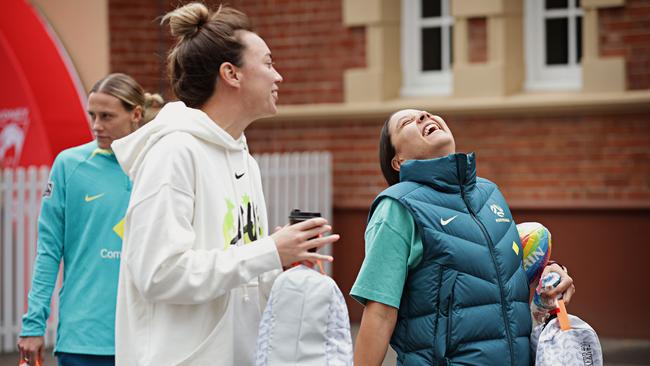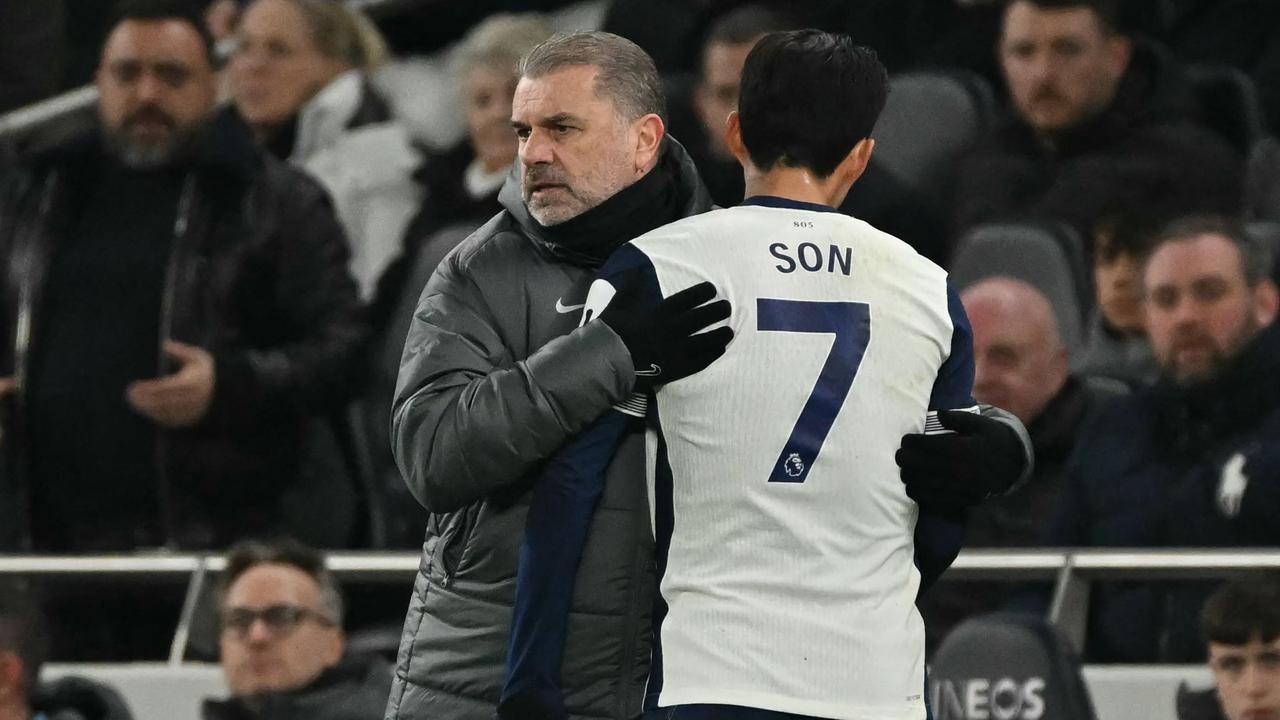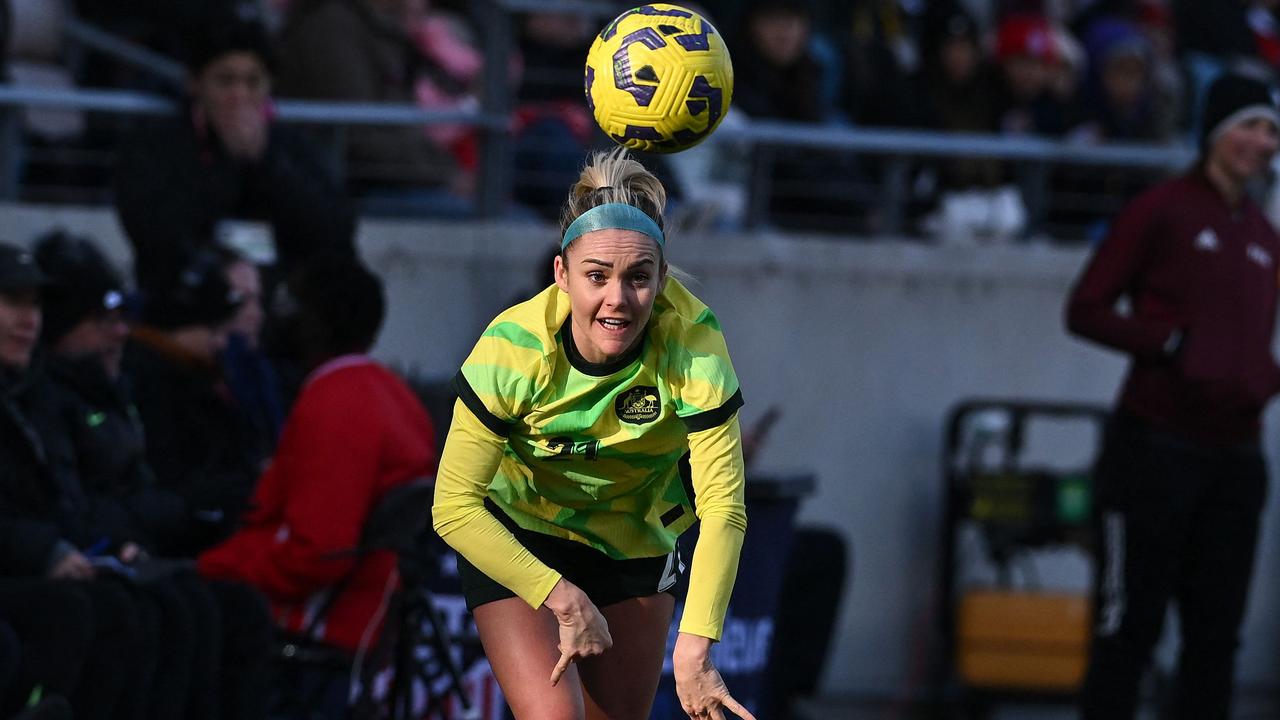Matildas will get $400,000 each for World Cup win, but parity pay fight goes on
The Matildas are set to earn more than $400,000 each if they win Sunday’s Women’s World Cup final – but the fight for pay parity continues.

The Matildas are set to earn more than $400,000 each if they win Sunday’s Women’s World Cup final – but the fight for pay parity continues.
Professional Footballers Australia co-chief executive Kate Gill said the gender pay gap when it came to FIFA prizemoney was unacceptable.
The total $US110m ($170m) announced by the world governing body for the expanded 32-team tournament falls drastically short of what the men get. FIFA awarded $440m to the men for the 2022 World Cup in Qatar.
Gill said players would consider taking action if it was not closed in time for the 2027 Women’s World Cup.
“Effectively they are earning 25 per cent of what their male counterparts do,” Gill said. “Yes, we have seen an increase, but it has still fallen very short of the players expectation.
“When we were looking at it back in 2019 and prosecuting it, the women’s situation was actually regressing because the men’s prize pool was increasing exponentially – it was widening the pay gap even more.”
The Matildas’ win over France via a thrilling penalty shootout on Saturday is worth at least an extra $110,000 to $150,000 for each of the squad of 23, based on the difference in prizemoney between getting knocked out in the quarter-finals and finishing third or fourth, and even more if they go on to win the final.
The roughly $420,000 payday then would be more than the salaries of just about all the Matildas’ squad, bar estimated top earners Sam Kerr ($4m including salary and endorsements), Ellie Carpenter ($1.1m) and Mary Fowler ($800,000). The rest likely earn less than $400,000 each annually, including a central contract with Football Australia worth up to $100,000 each plus club salaries.
Players such as highly rated young midfielder Kyra Cooney-Cross are said to earn about $100,000 per season in Sweden, while the likes of Caitlin Foord and Steph Catley could be on $250,000-300,000 at Arsenal in England’s Women’s Super League.
Others such as heroic goalkeeper Mackenzie Arnold would probably earn less at an English club such as West Ham. Katrina Gorry, who has covered more kilometres on the pitch than any other player in the tournament, is said to have been paid about $30,000 by Brisbane Roar in the last A-League season, and supplemented her income with a stint in Sweden before the World Cup.
The Matildas have achieved parity with their Socceroos counterparts at a local level at least when it comes to national team payments.
“At the heart of our agreement is revenue sharing, which effectively means the Socceroos do a deal with Subway or when the Matildas do a deal with CommBank or Lego, that goes into a pool of money and then it’s distributed equally,” said Football Australia CEO James Johnson.
FIFA president Gianni Infantino said in March FIFA’s ambition was to have equality in player payments for the 2026 Men’s and 2027 Women‘s World Cup. “This is the objective that we set ourselves,” Infantino said. “FIFA is stepping up with actions, not just with words.”
Gill said she believes if Infantino did not lock in equal payments, players would take action to encourage pay parity. “I am sceptical at best that he will do it … unless he is forced to, and that would take collective player action.”
Player agents also say now is the time for corporations to pay women as much as men for endorsement deals.
“We’ve been telling the corporate sector for a while now this tidal wave that is the World Cup is coming. They would say something like ‘we’re interested, but … ’ or we’d ‘like to do something, but …’. Well, the time for “buts” is over now,” said Leon Spellson, managing director of ESE The Agency, who looks after commercial deals for players such as Hayley Raso.
Sports marketing expert Tristan Hay said the Matildas are one of Australia’s most marketable sports teams ever.
“It’s been a very Australian way, the way they’ve gone about it, there hasn’t been any showboating or any behaviour that might rub some people the wrong way. They just compete super hard and, again, that’s what brands want.”
Dave Flaskas, who managed Olympic swimmers such as Ian Thorpe, said it was imperative Football Australia and everyone aligned with the Matildas capitalised on the moment. “You’ve seen this happen with the Olympics and then we move on. These girls don’t deserve that to happen.”


